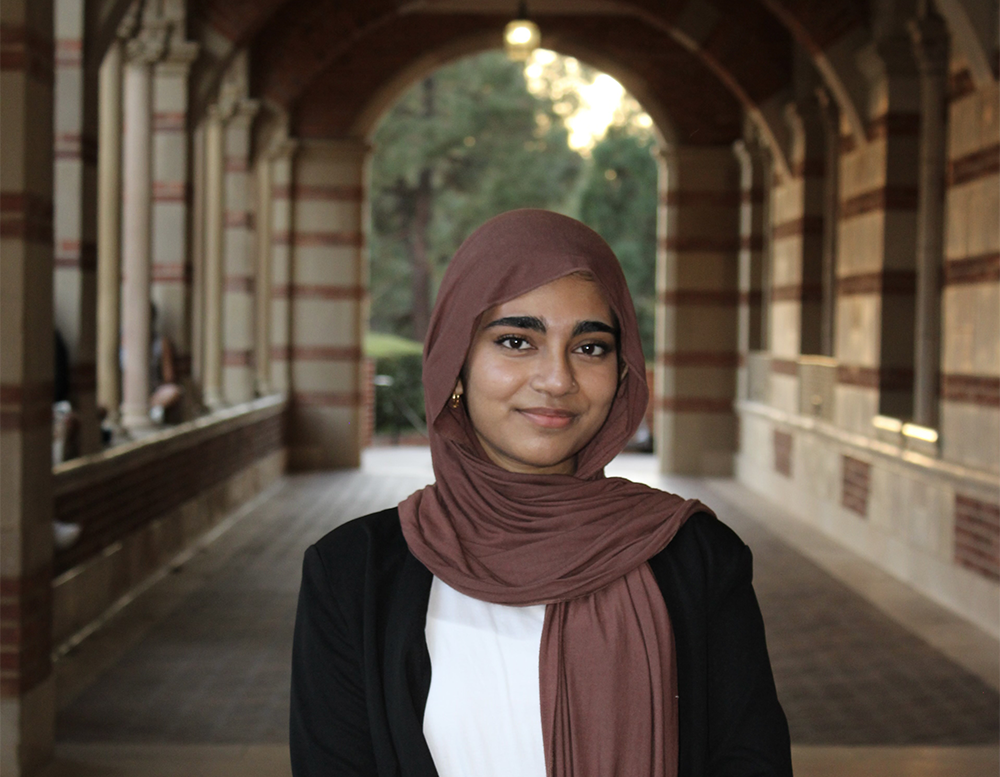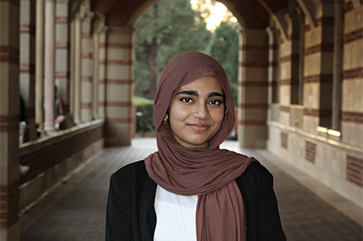‘Bruins Studying Bruins’
An innovative course inspires undergraduates to think about research — and themselves — in a new way

Courtesy of Tasnim Jahan
Undergraduate Tasnim Jahan co-created a video summing up findings from the “Bruins Studying Bruins” course in which she participated.
By Jonathan Riggs | October 30, 2023
Undergraduate research has long been one of the key strengths of the UCLA experience. But what happens when students themselves become the subject of study?
A new course last winter, “Bruins Studying Bruins: Introduction to Higher Education Research through a Course-Based Collaborative Research Project,” allowed students to turn their scientific gaze inward. Using oral presentations recorded by their peers in 2020 for Undergraduate Research Week — UCLA’s annual, weeklong celebration of student research and achievement — members of the class drilled down into the science and structure of formal assessment.
“The point of this class was for students to design and deploy a rubric to evaluate student presentation skills, which sparked so many conversations, collaborations and critical thinking about research and how it’s assessed,” says Tama Hasson, assistant dean for undergraduate research and director of the UCLA Undergraduate Research Center–Sciences. “We barely advertised this course, and almost immediately it filled up with a waitlist — we had students of all years and majors eager to get involved and engaged with research in a way they perhaps hadn’t considered before.”
The course was co-taught by Hasson and Kelly Kistner, assistant director of the UCLA Undergraduate Research Center–Humanities, Arts and Social Sciences, with collaboration from Kelly Wahl, assistant dean of summer sessions and strategic initiatives, and neuroscience doctoral student Amy Than.
“It was quite incredible to me to see undergraduate students in this course complete a research project together from start to finish,” says Than. “The pilot year for any course is often just as exciting as it is uncertain, so I’m glad we all took the leap of faith to take on this research project together. This experience is easily one of the highlights of my doctoral training and has made me so proud to be a Bruin.”
“It was great seeing the students reflect critically on the process and really see what goes into education research and social science research more generally,” says Kistner. “So much of it involves carefully defining what it is you’re measuring, even before you can begin measuring it — and then again as you’re going along, and then again as you’re communicating it.”
Over the span of the course, students watched 324 research presentations as a group multiple times, with new questions arising the deeper they thought about assessment. This included examining the factors that could potentially impact what was intended as an impartial evaluation: everything from the subject matter of the presentation, to the time of day it was viewed, to whether or not the presenter appeared on camera — and, of course, the importance of not confusing polish and charisma with rigor and data.
Key to the course’s success was the fact that the students were able to take the lead in these discussions and in the creation of the assessment tool together. In fact, undergraduates Tasnim Jahan (psychobiology) and Kate De Guillenchmidt (neuroscience) created a video for Undergraduate Research Week this past spring to sum up the class’s findings and provide tips for future presenters.
“While taking this class, we were exposed to presentations of all types, ranging from the history of the Holocaust to research done on E. coli. I realized I don’t need to have preexisting experience in the major to understand, since a good presentation would be able to explain it to me, and an effective rubric is holistic,” says Jahan. “This was a good introductory course as I look ahead to working in a lab myself, and hopefully creating and presenting my own research presentations one day.”
The first taste of collaborative research for many students in the class, the course also offered them the opportunity to give back to UCLA in a unique way.
“This project highlighted one of the core competencies for undergraduates to master — oral communication — and studied student work, so that the students could, in a subsequent research tutorial course, design a training tool for their peers to improve their skills in this area,” says Wahl. “We had committed to conducting such research in our last WASC Senior College and University Commission self-study for reaffirmation of accreditation, so this research project is evidence that we are making good on what we pledged to accomplish.”
The course will be offered again this winter, but themed this time around making research presentations more accessible. Those involved are glad it is continuing, especially since it is in line with the Undergraduate Research Centers’ desire to encourage more UCLA faculty to develop course-based undergraduate research experiences or integrate them into the curriculum.
“I have been fortunate to be a part of research teams at UCLA surveying and analyzing outcomes from our graduating seniors and alumni. We have found some very strong connections between research experience and the development of broadly in-demand career skills — like written and spoken communication, problem-solving and critical thinking — but also high levels of personal self-satisfaction, confidence and curiosity,” adds Kistner. “And, by the way, that’s all coming from our research on non-STEM undergraduate research. It really speaks to the value of humanities, arts and social science inquiry at a time when those areas are continually threatened with less funding.”
Ultimately, the purpose and progress of “Bruins Studying Bruins” underpins one of the many reasons why UCLA is a special institution.
“As a research university, to make good on our commitment to this part of our institution’s identity, our undergraduates need opportunities to participate actively in research and make substantial gains in their critical thinking, information literacy and communication skills,” concludes Wahl. “The study undertaken in this class can provide important information to support how the URCs enrich undergraduates in this space — and beyond.”




